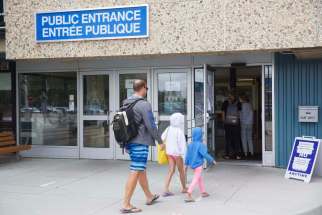NBA players set tone as sports hit pause
Read this article for free:
or
Already have an account? Log in here »
To continue reading, please subscribe:
Monthly Digital Subscription
$0 for the first 4 weeks*
- Enjoy unlimited reading on winnipegfreepress.com
- Read the E-Edition, our digital replica newspaper
- Access News Break, our award-winning app
- Play interactive puzzles
*No charge for 4 weeks then price increases to the regular rate of $19.00 plus GST every four weeks. Offer available to new and qualified returning subscribers only. Cancel any time.
Monthly Digital Subscription
$4.75/week*
- Enjoy unlimited reading on winnipegfreepress.com
- Read the E-Edition, our digital replica newspaper
- Access News Break, our award-winning app
- Play interactive puzzles
*Billed as $19 plus GST every four weeks. Cancel any time.
To continue reading, please subscribe:
Add Free Press access to your Brandon Sun subscription for only an additional
$1 for the first 4 weeks*
*Your next subscription payment will increase by $1.00 and you will be charged $16.99 plus GST for four weeks. After four weeks, your payment will increase to $23.99 plus GST every four weeks.
Read unlimited articles for free today:
or
Already have an account? Log in here »
Hey there, time traveller!
This article was published 28/08/2020 (1931 days ago), so information in it may no longer be current.
Professional athletes from around the world have suddenly found themselves in a position to be game changers, and not in the conventional sense.
It all started on Wednesday, when players on the National Basketball Association’s Milwaukee Bucks voted to boycott their scheduled playoff game with the Orlando Magic to protest the police shooting of Jacob Blake in Kenosha, Wisc. Mr. Blake was shot seven times in the back as he attempted to get back into his car, where three of his children were sitting. He is in hospital, reportedly paralyzed from the waist down.
As the only NBA team in Wisconsin, the Bucks clearly felt an obligation to take a stand. Within two days, they were joined by players of other NBA teams. And then, players in Major League Baseball, the Women’s National Basketball Association, Major League Soccer, the National Hockey League and professional tennis all agreed to boycott their games and matches.

No one is quite sure where this protest is headed. NBA players from the teams that remain in the playoff hunt voted to resume games, and it is assumed that most of the other leagues will at some point return to competition. But the message behind their boycott is clear: quiet, symbolic protests such as kneeling during the playing of the American national anthem are not doing enough to change the way Black people are treated by police, or to address the broader issue of systemic racism.
Basketball was a fitting place for this protest to start. Despite the fact that three quarters of all players in the NBA are Black, there are only a handful of Black team presidents and general managers, and only one Black majority owner. Notwithstanding their wealth and fame, the way basketball treats its Black players is proof positive that systemic racism is real.
The biggest ongoing question, though, is whether the boycotting of games lead to real change. There are signs that the players have very specific goals in mind.
Consider that when Milwaukee Bucks players first let it be known they were boycotting their game, they got an audience with Wisconsin Lt.-Gov. Mandela Barnes and Attorney General Josh Kaul. In that video conference, the players demanded the officer involved in the shooting of Mr. Blake be charged, and that the Wisconsin state legislature reconvene immediately to consider a bill on police reform proposed by Gov. Tony Evers.
This is a clear indication the players understand their considerable potential to influence matters well beyond the confines of their sports. This is not a group of athletes lashing out in indiscriminate anger; this is a methodical job action designed to spur legal and political solutions.
Now that they have everyone’s attention, the athletes have the opportunity and the power to spark real change.
They are no doubt aware that, in this era of nearly constant protest, lawmakers have learned to calm protesters by making hollow promises, only to migrate back to the status quo once the streets have cleared. Professional athletes have a chance to create a different end to the story they have begun this week to write.
If lawmakers do not quickly regroup and take meaningful action to curb the types of force used by police officers against racialized citizens, and to address broader issues of systemic racism, there’s every indication the athletes are prepared to withdraw their services once again. Real change is much more likely to be set in motion once society realizes their sports heroes are committed to action more forceful than taking a knee.

















